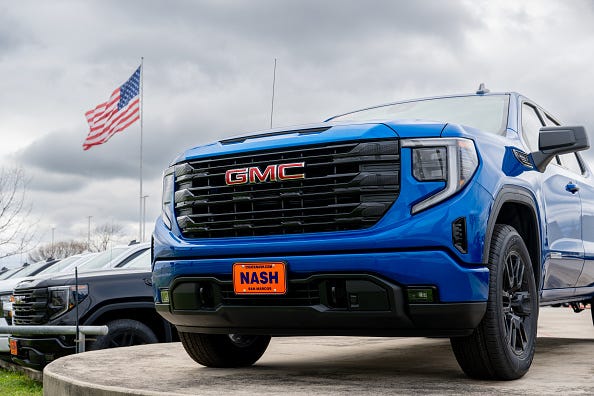
DETROIT (WWJ) -- President Donald Trump's tariffs against Canada and Mexico have gone into effect. Among many other products, they're expected to impact the price of vehicles in the U.S.
Under Trump's order. imports from Canada and Mexico are now taxed at 25%, with Canadian energy products subject to 10% import duties.
Now, U.S. automakers are bracing for the impacts, including Ford CEO Jim Farley, who has has said these tariffs could "devastate" the U.S. auto industry.
WWJ Newsradio 950 Auto Analyst John McElroy says the cost of car parts, which come in from Canada, is a major concern.
"Tariffs impact everything. Because, remember, these aren't just tariffs on the vehicles coming in. They are tariffs on parts and components," McElroy said. "And so there's a lot of parts and components that come in from Canada and Mexico, and the price of them is going to go up."
McElroy consumers in the market for a new car should expect sticker shock at the dealership as a result of these tariffs.
"Prices are going to go up," McElroy said. "The Anderson Economic Group came out about a week or so ago predicting that full-size truck and SUV prices will go up in the $9,000 to $10,000 range, and most other vehicles will go up by about $4,000."
The highest estimates from Anderson, a Michigan-based economic consultancy, said the tariffs could drive up the cost by some models by as much $12,200.
"Our analysis shows the proposed tariffs would have a very big effect on North American assembled cars by multiple automakers," Anderson told CBS MoneyWatch. "These are cost increases that cannot be hidden from the consumer. Substantial portions, or perhaps all of it will be passed along to consumers, or manufacturers will stop producing them."
McElroy stressed that these are American cars we're talking about, not just imports.
He said some consumers will still pop for the more expensive American cars, but he does expect to see Big Three sales trend down.
"We're already seeing consumers complaining loudly about the prices of new cars, and are moving into smaller, less expensive vehicles," McElroy said. "And we're going to see that trend continue at the same time that we see overall sales go down."
Want to get caught up on what's happening in SoCal every weekday afternoon? Click to follow The L.A. Local wherever you get podcasts.
Among local leaders concerned about the tariffs is Sterling Heights Mayor Michael Taylor, a lifelong Republican, who noted that Ford has two large auto plants in Sterling Heights. In a statement posted to Facebook, Taylor said he'll be monitoring the effects.
"Almost 40% of the jobs in Sterling Heights are auto related. The local auto industry cannot absorb a 25% tax on imports without substantial disruption to its operations. Economists expect firms will adapt through a combination of layoffs and cost increases," Taylor said.
"These tariffs are ill-conceived," he continued. "The United States is at nearly full employment, with just a 4% unemployment rate. American consumers benefit from free trade with Canada and Mexico by having lower prices and access to more goods. If the goal is to increase U.S. employment and output in the auto industry, the gains will be mitigated by the necessary increases in costs. And any speculative benefit would take years (if not a decade or more) to realize."
So, why do this? Trump has said the tariffs are to force Mexico and Canada to step up their fight against fentanyl trafficking and stop illegal immigration. Trump has also indicated that he wants to even out the trade imbalance with both countries as well and push more factories to relocate to the U.S.
This all comes after, in February, Trump put a 10% tariff on imports from China. He reemphasized Monday that the rate would be doubling to 20% on Tuesday.
Speaking live on WWJ Tuesday morning, Congresswoman Debbie Dingell, a Democrat representing the Detroit area, said she's "really worried" about what the tariffs will do to Canada, Mexico and the U.S.
"I am not someone that is an anti-tariff person. I think tariffs are a tool in the tool box." Dingell said. "But I believe the way these are being imposed, I think we need...a trade policy that is strategic, We need to give the auto industry time to adjust."
Tuesday's move by Trump comes ahead of his first address before a joint session of Congress since re-entering the White House. It's likely the president will touch on the tariff's during his speech, which is expected to focus heavily on economic issues.
Follow KNX News 97.1 FM
